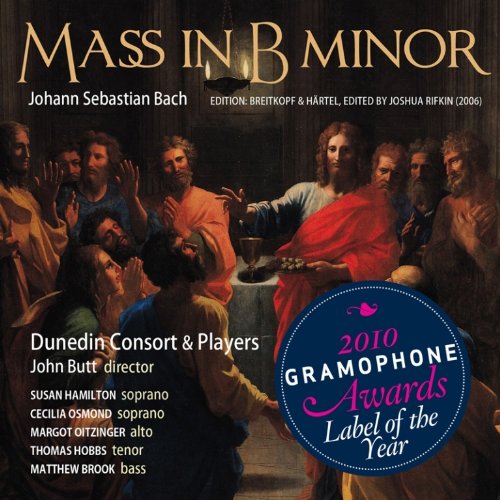Bach Mass in B Minor
An academic approach yields an enthralling performance of Bach’s magnum opus
View record and artist detailsRecord and Artist Details
Composer or Director: Johann Sebastian Bach
Genre:
Vocal
Label: Linn
Magazine Review Date: 8/2010
Media Format: Hybrid SACD
Media Runtime: 102
Mastering:
Stereo
DDD
Catalogue Number: CKD354

Tracks:
| Composition | Artist Credit |
|---|---|
| Mass |
Johann Sebastian Bach, Composer
Cecilia Osmond, Soprano Dunedin Consort Dunedin Players Johann Sebastian Bach, Composer John Butt, Conductor Margot Oitzinger, Alto Matthew Brook, Bass Susan Hamilton, Soprano Thomas Hobbs, Tenor |
Author: David Vickers
Butt has considered every musical connection, context, texture and form. Not only do the individual movements feel spot-on in articulation and affekt but the free-flowing pacing from one section to the next makes it easy for the listener to be pulled along. Each section of the Roman Ordinary is envisaged as continuous music, so there are no pregnant pauses between solo and choral movements. The first chords of the “Kyrie” are sung boldly by the 10 singers (five “principals” and another five “ripienists”), and the solemn fugue is performed with gentle ardency; every gesture, detail, suspension and arching line is judged and executed with transparency, flexibility and rhetorical potency.
Thomas Hobbs and Matthew Brook sing the principal lower-voice contrapuntal passages with sensitive blend and superb intonation: they also declaim their solo movements with confidence and eloquence. The higher-voiced principals are marginally less successful: the combination of Susan Hamilton and Cecilia Osmond in the duet “Christe eleison” occasionally threatens fragility but perhaps more authoritative and smoother-toned soprano soloists would have been less adaptable in the choruses. Butt’s flowing tempo for “Agnus Dei” prevents Margot Oitzinger from conveying the breathtaking timelessness some might hanker after but catharsis is tangible in “Benedictus” (performed movingly by Hobbs and flautist Katy Bircher). The galant character adopted by Butt’s elegant harpsichord continuo, Patrick Beaugiraud’s poignant oboe and tasteful strings during “Qui sedes” proceeds without pause into “Quoniam”; Anneke Scott’s sparky horn playing and Matthew Brook’s conversational authority conspire to take no prisoners, and the momentum carries through into a knock-out “Cum Sancto Spiritu”.
Once upon a time the bravery of minimal forces tackling this repertoire was ridiculed by sniffy sceptics. Butt and the Dunedins might not change any entrenched minds; but the climax of “Gratias agimus tibi” is as bold, resonant and glorious as anything one would expect (and not always get) from larger forces. The opening of the “Gloria” bursts forth with radiant splendour but also has a dance-like lilt, and with Bach’s intricate writing emerges as a compelling dialogue.
The Dunedin Consort’s singing conveys the ebb, flow and shading of Bach’s choruses with ease and naturalness. The sonorities of full homophonic chords concluding the grandest choruses are thrilling, whereas the densely polyphonic choral passages always possess clarity and logic thanks to the disciplined interplay of the singers. The five principals combine to rapturous effect in “Et incarnatus est”, and Butt’s handling of the strings and flutes during “Crucifixus” is both patient and emotionally charged.
Many excellent recordings of this monumental work cater for different tastes and priorities. Some have more consistent line-ups of soloists, equally impressive choirs (of varying sizes) and comparably strong artistic direction. Although an excellent one-voice-per-part version is nothing new, Butt’s insightful direction and scholarship, integrated with the Dunedin’s extremely accomplished instrumental playing and consort singing, amount to an enthralling and revelatory collective interpretation of the Mass in B minor – perhaps the most probing since Andrew Parrott’s explosive 1985 version (Virgin, 8/86R).
Discover the world's largest classical music catalogue with Presto Music.

Gramophone Digital Club
- Digital Edition
- Digital Archive
- Reviews Database
- Full website access
From £8.75 / month
Subscribe
Gramophone Full Club
- Print Edition
- Digital Edition
- Digital Archive
- Reviews Database
- Full website access
From £11.00 / month
Subscribe
If you are a library, university or other organisation that would be interested in an institutional subscription to Gramophone please click here for further information.




